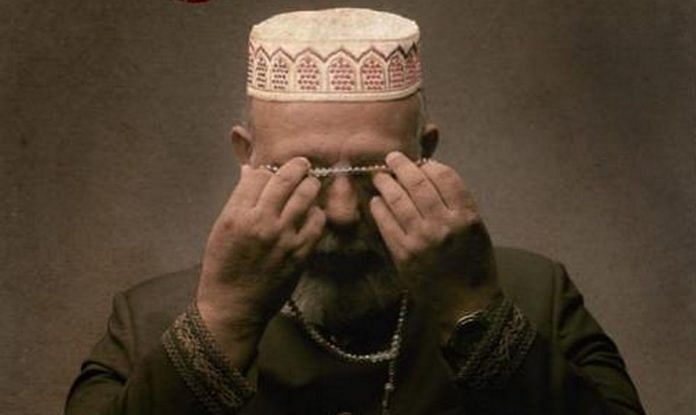The fiasco around a Pakistani film called Zindagi Tamasha shows who is actually running the tamasha in Imran Khan’s land. No, not even Imran Khan is. But the blasphemy wielding Islamic zealots.
It was last year that Zindagi Tamasha or Circle of Life, a film by Sarmad Khoosat on a devout elderly Muslim man who is judged harshly by society for dancing, was prevented from releasing in Pakistan. Since then, Zindagi Tamasha has been Pakistan’s official entry to the Oscars and has won the Snow Leopard Award for the Best Film and Actor at the 6th Asian World Film Festival. Earlier it won the Kim Ji-seok Award at the Busan International Film Festival.
Amid death threats to the filmmaker and blasphemy allegations, Zindagi Tamasha never saw the light of day for Pakistani audiences. Despite the film eventually clearing all censor boards, the Imran Khan government succumbed to the pressure of the Islamist group Tehreek-e-Labbaik (TLP) and asked the Council of Islamic Ideology to weigh in on the matter. The Council that essentially oversees law-making is now engaged by the government on films and taglines. The Council of Islamic Ideology last week stopped the government from using “Corona se darna nahi larna hai” anti-Covid tagline because it was “un-Islamic” as the virus is “God’s will” that cannot be fought.
So, obviously, when it came to Khoosat’s film, all it took was a 130-second film promo to rile the late TLP leader Khadim Hussain Rizvi and his supporters. From that promo, the religious group figured out that the film is blasphemous because the protagonist was seen as a naat khawan (someone who recites religious poetry), that it was a story about molestation that showed mullahs in bad light, and that the name “Asia” heard in the promo was of Pakistani anti-blasphemy victim Asia Bibi. The film actually revolves around Rahat Khawaja (played by Arif Hassan) whose dance video at a wedding goes viral on social media and the subsequent ordeal his family faces.
Although several attempts were made by the team of Zindagi Tamasha to set the record straight—Khoosat even wrote a letter to PM Imran Khan—but to no avail. This only strengthened Rizvi and his ilk.
Also read: Pakistani Islamic group now goes after a film on a bearded man and Imran Khan caves
The blasphemy weapon
Blasphemy accusations against artistes aren’t a new tool of harassment.
In 2014, after appearing on a morning show on Geo television, actress Veena Malik, her husband Asad Khan, host Shaista Lodhi, Jang News owner Mir Shakil ur Rehman and Sufi singer Amjad Sabri were booked for blasphemy. It was said that a traditional qawwali sung by Sabri mentioned religious figures and was “offensive”. Sabri was assassinated in 2016 by the Pakistan Taliban.
In an incident in 2020, actor Saba Qamar and singer Bilal Saeed were booked for blasphemy for a video shoot for Qabool in Lahore’s Wazir Khan mosque after a campaign led by Rizvi. It happened despite the actor and the singer apologising and explaining that no dance or music actually happened in the mosque.
The vicious online attacks resulted in action — first Zindagi Tamasha was dropped, then the team of Qabool was reprimanded and now the lives of the makers and actors are in constant danger.
The same happened to the participants of the Aurat March this year: several doctored videos and morphed banners from Women’s Day went viral on social media and an onslaught of blasphemy accusations poured in. This put the lives of several women in danger. Meanwhile, the clerics of Lal Masjid in Islamabad want a ban on the Aurat March as well as Valentine’s Day.
Also read: Pakistani State sympathises all sorts of religious groups. Khadim Rizvi was just one of them
A tight rein
Every time religious pressure groups like the TLP threaten the government with anti-blasphemy protests, the State’s standard response comes as no surprise. And history keeps repeating itself in Pakistan.
From the time the TLP protested in 2017 against the Nawaz Sharif-led Pakistan Muslim League-Nawaz government for changing an election oath, to when Ahmadi economist Atif Mian was removed by the Imran Khan government from an advisory body over backlash, to the most recent demonstrations against the French government for “blaspheming” — the TLP has a tight leash on Pakistan.
The Khan government has struck a deal with the TLP promising the expulsion of the French ambassador, not appointing its own ambassador to France and boycotting French goods. But there is no mention of boycotting French aid to Pakistan.
Ironically, the prime minister is ready to be blackmailed by TLP supporters who have the weapon of blasphemy, but he won’t be ‘blackmailed‘ by protesters of the Hazara community who demand to be heard by the government against their religious persecution.
The author is a freelance journalist from Pakistan. Her Twitter handle is @nailainayat. Views are personal.
Edited by Neera Majumdar.




Even most muslim countries have abolished blasphemy law. It is a shame that Pakistan is so insecure of it’s majority religion that it continues to use the law to harass minorities.
Is the Print Pakistani news channel?
No, but non-Muslims need to know the hidden face of Islam.